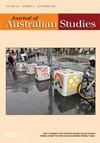认同中的差异:本土知识的认同、成长与循环
IF 0.4
3区 历史学
Q3 AREA STUDIES
引用次数: 2
摘要
循环思维的概念很容易归因于土著知识的模式,其特点是与西方认识论的假定线性不同;通过这一隐喻来接近认识论是通过差异来预测身份,并强调知识在有限的文化坐标中的自主性。在寻求对人类认知交织轮廓的更细致的欣赏时,我认为一些领先的澳大利亚土著思想家通过创造性的重复来巩固文化身份,并在动态关系中得到认可。这些探索包括:mandawway Yunupiŋu将Yolŋu思想解释为一个制造“新连接和新分离”的过程;由Wägilak歌手Daniel Wilfred演唱的manikay(公共仪式歌曲);Tyson Yunkaporta的“转机”概念;Wanta Jampijinpa Pawu的“家”框架以及斯坦·格兰特对澳大利亚议会的土著之声的诠释。与差异对身份的循环划分相反,这些声音证明了身份内部的差异如何能够推动相互的形成和成长,这表明了黑格尔对循环概念的扭曲,在这种循环概念中,关键的差异产生了一个不断扩大的认识和意义的环流。本文章由计算机程序翻译,如有差异,请以英文原文为准。
Difference within Identity: Recognition, Growth and the Circularity of Indigenous Knowledge
ABSTRACT The concept of circular thinking is readily attributed to patterns of Indigenous knowledge, characterised as distinct from the supposed linearity of Western epistemology; to approach epistemology through this metaphor is to anticipate identity by difference and underscore the autonomy of knowledge within bounded cultural coordinates. In seeking a more nuanced appreciation of the interwoven contours of human knowing, I consider some leading Indigenous Australian thinkers who understand cultural identities to be consolidated through creative repetition and recognised within dynamic relationality. These explorations include Mandawuy Yunupiŋu’s interpretation of Yolŋu thought as a process of making “new connections and new separations”; the performance of manikay (public ceremonial song) by Wägilak singer Daniel Wilfred; Tyson Yunkaporta’s conceptualisation of “turnaround”; Wanta Jampijinpa Pawu’s framework of ngurra-kurlu (home-having); and Stan Grant’s interpretation of an Indigenous Voice to the Australian Parliament. In contrast to the circular demarcation of identity by difference, these voices demonstrate how difference within identity can give impetus to mutual formation and growth, suggesting a Hegelian twist on notions of circularity in which critical differentiation generates an expanding gyre of recognition and meaning.
求助全文
通过发布文献求助,成功后即可免费获取论文全文。
去求助
来源期刊

Journal of Australian Studies
Multiple-
CiteScore
0.90
自引率
20.00%
发文量
56
期刊介绍:
The Journal of Australian Studies (JAS) is the journal of the International Australian Studies Association (InASA). In print since the mid-1970s, in the last few decades JAS has been involved in some of the most important discussion about the past, present and future of Australia. The Journal of Australian Studies is a fully refereed, international quarterly journal which publishes scholarly articles and reviews on Australian culture, society, politics, history and literature. The editorial practice is to promote and include multi- and interdisciplinary work.
 求助内容:
求助内容: 应助结果提醒方式:
应助结果提醒方式:


